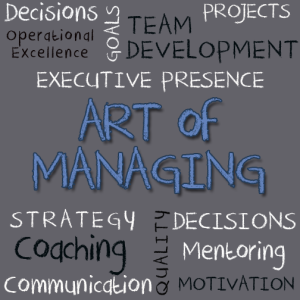 The Art of Managing series is dedicated to exploring the critical issues we face in guiding our firms and teams to success in today’s volatile world.
The Art of Managing series is dedicated to exploring the critical issues we face in guiding our firms and teams to success in today’s volatile world.
—
Note from Art: this post inspired by the excellent new book, “The Navy Seal Art of War—Leadership Lessons from the World’s Most Elite Fighting Force,” by Rob Roy with Chris Lawson.
When asked how he wanted to be remembered, the late, great quality and management guru, W. Edwards Deming responded with, “I probably won’t be remembered.” After thinking about it, he added, “I would like to be remembered for trying to keep (American) businesses from committing suicide.”
While wrong on the former…although I’m finding less and less familiarity with Deming and his work with my ready-to-graduate MBA students, his emphasis on railing against and eliminating the sloppy management approaches that destroy potential and confound otherwise motivated employees (regardless of country affiliation) is still very relevant. Perhaps now more than ever, given the complexity of today’s world versus the world that rose from the ashes of World War II that Deming experienced.
In a sea of books and articles published regularly on navigating complexity in our world today, few capture the solution as succinctly as the three words: humility, teamwork and focus. (Roy uses the appropriate military appropriate term, “mission” in place of my choice of the word focus.)
One defines the attitude required for success from the top to the bottom; one defines the essential obligation of each and every individual engaged in any initiative and the other describes the need for context or common purpose. Misfire on one or more of these and the results range from poor to disastrous.
The New Ingredients for Organizational Success:
The firms and teams I’m finding that are succeeding in this world characterized by uncertainty, ambiguity and risk have re-thought 3 core issues tied to these terms:
1. The role of the leader. Today’s effective leader exists primarily to serve the team. The role is very little about command and control and much more about serving and supporting and importantly, working relentlessly to realize an environment that allows a true team to emerge and sustain. It’s less about authority and much more about recruiting and developing talent, establishing and reinforcing expectations and accountability and about serving and protecting the team members. And, it’s about ensuring that team members are able to step up and lead if the situation demands it. This leader…today’s effective team leader in my view is one who is good with people…not one who leads solely based on title and level in a hierarchy. I like this leader. It feels like we’re finally getting this role right for this world we live and work in.
2. The critical importance of the team. Look at the reported statistics on failure rates with the two most relevant team challenges in our organizations: strategy execution and project management (McKinsey on strategy execution failure; Standish Group Chaos Report on project failure), and it is safe to conclude that many of us haven’t cracked the code on deriving value from the sum of the parts with our teams.
In my observations of many different organizations who are winning in today’s environment, at least part of their success stems from having fundamentally rethought everything about the nature, purpose, structure, leadership and support of the team. Gone from these environments are the loose confederations of resources, replaced instead by lean groups comprised of cognitively diverse individuals focused on a single mission. Focus is key…and in my experience, it is almost always missing with groups who are flailing or who have failed. And of course, where I’m finding teams that are working…succeeding with innovation, product development, IT infrastructure deployment and strategy execution, I don’t have to look far to find a leader that fits the description above. Often they are the quietest ones in the room. Humble but fierce.
3. The attitude about risk. Risk has long been something we strive to tame, but much like the weather, we’re better off doing everything we can to anticipate changes and adverse events and then learning to quickly respond or adapt. Teams that are winning have invited risk to their parties in the form of fast-to-fail or the positive form, fast-to-learn type approaches. Instead of giving lip-service to experimentation (which demands failure on the path to success), they are living it and learning from it at a hyper pace. The focus on team; the right leadership and the focus on the mission are essential ingredients to enabling successful experimentation.
The Bottom-Line for Now:
I’m growing fatigued with firms frozen in place as they watch their world change while they grow more obsolete by the minute. This is an outcome of leadership failure at the top and chronic organizational laziness. Similarly, while the work products (books, articles) that describe the complexities of today’s and tomorrow’s worlds are fascinating… they do a great job describing the ever-changing weather, they often fail to offer much help on how to survive, adapt and succeed. At least part of the answer is simple…but not simplistic. Rethink the role of the leader; rethink and accept risk as essential to learning in your environment and strive to realize true teams versus those imposter groups that bungle so many of our initiatives. Humility, teamwork and focus are three powerful starter ingredients.
—
Don’t miss the next Leadership Caffeine-Newsletter! (All new subscriber-only content!) Register here
For more ideas on professional development-one sound bite at a time, check out: Leadership Caffeine-Ideas to Energize Your Professional Development.
New to leading or responsible for first time leaders on your team? Subscribe to Art’s New Leader’s e-News.
An ideal book for anyone starting out in leadership: Practical Lessons in Leadership by Art Petty and Rich Petro.
